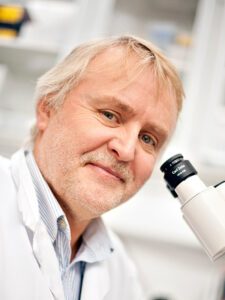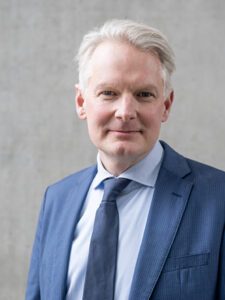Session 1: Innate Immunity and Inflammasomes
– Chairs: Andreas Diefenbach, Róisín McManus
09:45 – 10:10 Antigoni Triantafyllopoulou
10:10 – 10:35 Gerhard Krönke
10:35 – 11:00 Terje Espevik
11:00 – 11:25 Eicke Latz
Antigoni Triantafyllopoulou
German Rheumatism Research Centre Berlin, an Institute of the Leibniz Association, and Charité – Universitätsmedizin Berlin, Berlin, Germany
Amplification of autoimmune kidney damage by NKp46-activated ILC
Autoimmunity is required, but not sufficient for severe organ damage, suggesting that additional pathways may amplify inflammatory cascades at target organs. Tissue resident innate lymphoid cells control homeostasis and disease processes at barrier surfaces, yet their role in systemic autoimmune diseases remains poorly understood. Using high-resolution single cell profiling of kidney immune and parenchymal cells, combined with in vivo antibody blocking and genetic approaches, we show that activation of kidney-resident ILC1 by NKp46 is a crucial signal amplifier of kidney parenchymal cell activation and injury. We uncover that NKp46 signaling in ILC1 instructs a distinct immunoregulatory program that directs the population expansion of monocyte-derived macrophages via ILC1-derived CSF2. We suggest that dysregulated immune responses to nucleic acids lead to NKp46-mediated activation of tissue-resident ILC1 allowing monocyte-derived macrophages to access kidney epithelial cell niches and thereby promote parenchymal tissue damage and fibrosis. Thus, NKp46 signaling in ILC1 may be central amplifier of inflammatory cascades in autoimmune hosts.
 Gerhard Krönke
Gerhard Krönke
Charité – Universitätsmedizin Berlin, Department of Rheumatology and Clinical Immunology and German Rheumatism Research Centre Berlin, an Institute of the Leibniz Association, Berlin, Germany
Metabolic checkpoints controlling onset and resolution of inflammation
Increasing evidence highlights the mutual influence between cellular metabolism and the immune response. Recent data from our lab identified distinct metabolic pathways that control both the onset and the resolution of inflammation in response to different cytokines and microenvironmental factors. Identification of underlying mechanisms potentially allows the design of novel strategies for therapeutic intervention during the treatment of immune-mediated inflammatory diseases.
Biosketch
After graduating from the Medical University of Vienna in 2002, Gerhard Krönke worked as postdoctoral researcher at the Medical University of Vienna (2002-2004) and the University of Virginia, Charlottesville (2004-2006). From 2006-2015 he conducted his clinical training in Internal Medicine and subsequently in Rheumatology at the University Hospital Erlangen, where he worked as Senior Physician at the Department of Internal Medicine 3 from 2012-2023. In 2016, he was appointed Professor of Translational Immunology at the University of Erlangen-Nürnberg. In 2023 he moved to Berlin where he is now serving as director of the Medical Department of Rheumatology and Clinical immunology at the Charité University Hospital Berlin. His research focuses on cellular, molecular and metabolic pathways involved in the maintenance and break of immunological self-tolerance as well as the onset and resolution of inflammation. In particular, he is trying to understand the mechanisms and events leading to the development of inflammatory autoimmune diseases such as rheumatoid arthritis and systemic lupus erythematodes and to develop novel strategies for their diagnosis and treatment. In 2014 he received an ERC Starting grant in 2014 as well as an ERC consolidator grant in 2020 and is currently acting as the spokesperson of the DFG research unit FOR2886 “PANDORA” (Pathways triggering AutoimmuNity and Defining Onset of early Rheumatoid Arthritis).
 Terje Espevik
Terje Espevik
Centre of Molecular Inflammation Research, Department of Clinical Molecular Medicine, Norwegian University of Science and Technology, Trondheim, Norway
Inflammatory responses in macrophages are regulated by Rab11-family interacting protein 2 and signalling lymphocyte activation molecule family 1
Terje Espevik, Harald Husebye and Mariia Yurchenko
Extensive research on the NLRP3 inflammasome has revealed its central role in antimicrobial defense and in sterile inflammation. The exact mechanisms involved in the priming and activation of the inflammasome are still not clear. However, there is now increasing evidence that membrane trafficking and anchoring at membrane structures such as the trans-Golgi network (TGN) are instrumental steps for NLRP3 inflammasome assembly and activation. The Rab11-family interacting protein 2 (FIP2) is a regulator of intracellular vesicle trafficking and we have shown that FIP2 controls phagocytosis and IFN-b production. Recently, we have found that FIP2 plays a key regulatory role at multiple levels during NLRP3 inflammasome activation in human macrophages. We have demonstrated that the signalling lymphocyte activation molecule family 1 (SLAMF1) is a FIP2 interacting protein and regulates transport of TRAM to E.coli phagosomes acting as an amplifier of the TLR4-TRIF-TRAM signaling pathway. Based on these findings, we developed a SLAMF1-derived peptide, P7, which is linked to a cell-penetrating peptide for intracellular delivery. We found that P7 inhibits the expression and secretion of IFNβ and pro-inflammatory cytokines (TNF, IL-1β, IL-6) induced by TLR4. Also, it prevents death in mice subjected to LPS shock as well as inhibition myocardial infarction in mice. P7 also reduces signaling initiated by endosomal Toll-like receptors like TLR8 and TLR9. The inhibitory effects of the P7 peptide are due to interference with several intracellular protein–protein interactions, including TRAM–SLAMF1, TRAM–FIP2, and TIRAP–MyD88. Overall, P7 peptide has a unique mode of action and demonstrates high efficacy in inhibiting several TLR-mediated responses both in vitro and in vivo.
Biosketch
Terje Espevik is professor of Cell Biology at the Norwegian University of Science and Technology. The strategy of his research is to study cellular and molecular mechanisms that Toll-like receptors, inflammasomes and the complement system are using to mount inflammatory responses. The main goal is to identify new targets for treating inflammation that results in pathology.
 Eicke Latz
Eicke Latz
German Rheumatism Research Centre Berlin, an Institute of the Leibniz Association, and Charité – Universitätsmedizin Berlin, Berlin, Germany
Death and Inflammation
Biosketch
Prof. Dr. (med.) Eicke Latz studied medicine at the Georg-August University in Göttingen and the Freie Universität Berlin, following which, he worked as an intensive care physician at the Charité Universitätsmedizin. In 2001, he moved to the USA, working as a postdoctoral researcher at Boston University, then at UMass Chan Medical School, where he held his first professorship. In 2010, he returned to Germany and founded the Institute for Innate Immunity at the University Hospital Bonn. He became Scientific Director of the German Rheumatism Research Centre Berlin, a Leibniz Institute, and Professor of Experimental Rheumatology at the Charité Universitätsmedizin Berlin in 2023. His research interests concern how the innate immune system maintains health and under what circumstances it can promote disease. In particular, he investigates the molecular mechanisms that lead to activation or inhibition of the immune system and how these influence the inflammatory reactions in various diseases, such as rheumatic diseases, arteriosclerosis or Alzheimer’s disease.
At the University of Bonn, Prof. Latz was spokesperson of the Collaborative Research Centre “Metaflammation and Cellular Programming” (SFB 1454) and co-spokesperson of the Cluster of Excellence “ImmunoSensation²”. He has co-founded several biotech companies, including IFM Therapeutics (2017), Dioscure Therapeutics (2020), a ‘Stealth’ biotech’ (2020), and Odyssey Therapeutics (2021), which translate his discoveries into novel therapeutics and preventive approaches. He has been a highly cited scientist in immunology every year since 2014 having published more than 300 publications. Prof. Dr. Latz was elected as a member of the German National Academy of Sciences (Leopoldina) in 2016 and has received a number of prestigious awards, including the Gottfried Wilhelm Leibniz Prize in 2018.
